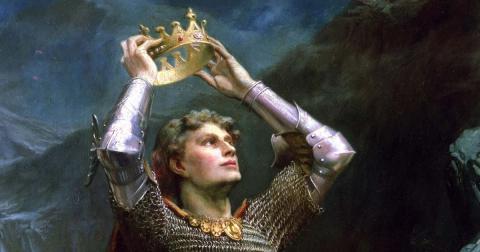King Arthur is undoubtedly one of the most enduringly popular heroes to come out of the medieval era, and he has meant many things to many people for hundreds of years. Over time, the mythology of Arthur grew as new stories were added to the existing ones and his fame spread throughout Britain and beyond. As a result of his popularity through the ages, King Arthur has come to represent various political causes as a symbolic figurehead, earning him a reputation as a champion of causes.
From medieval Welsh rebels to 20th century anti-Nazi campaigners, people have rallied behind Arthur’s war banner since before the idea of “Britain” was even created. But was Arthur more than just a hero to these people? Britain has had countless heroes throughout its history, but is Arthur’s enduring and overwhelming popularity a sign that he has become something closer to a Messiah?
After the cruel Saxons decimated the British and took their land from them, the survivors rallied behind their champion and fought to reclaim their lands, culminating in victory at the Battle of Badon Hill.
This idealized image of the defender and savior of the British people against the evil greed of the conquering Saxons gathered momentum in the Middle Ages, as other authors took up the tradition. The 9th century eclectic history known as the Historia Brittonum paints the “magnanimous” Arthur as leader of all the kings of Britain and their armed forces, famously listing the 12 battles against the Saxons in which he was chosen to be their commander.
It is in the Historia Brittonum that Arthur begins to take on a persona of something more than an ordinary hero, and supernatural qualities begin to emerge in his character: “The twelfth was a most severe contest, when Arthur penetrated to the Hill of Badon. In this engagement, nine hundred and forty fell by his hand alone, no one but the Lord affording him assistance.”
No singular warrior, no matter his competence, could pull off such a feat, but the accounts of Arthur’s miraculous skills appear again in Geoffrey of Monmouth’s 12th century History of the Kings of Britain. Geoffrey describes how Arthur led the Britons into battle against the Saxon army: “as he called on God, he killed any man he touched with a single blow and pressed forward until with Caliburnus [Excalibur] alone he had laid low four hundred and seventy men.”
Such superhuman strength and skill renders Arthur more than an ordinary hero, more mythology than man, but supernatural qualities alone do not transform Arthur into a Messianic figure. It is in the writings of Geoffrey of Monmouth that other Messianic qualities begin to appear in Arthur.
Read the rest of the legendary King Arthur’s story in the article ‘King Arthur: A Very British Messiah?’ Available in the January - February 2023 issue of Ancient Origins Magazine. Get it here!
Feature Image: ‘King Arthur’ (1903) by Charles Ernest Butler. Source: Public domain
By Meagan Dickerson




